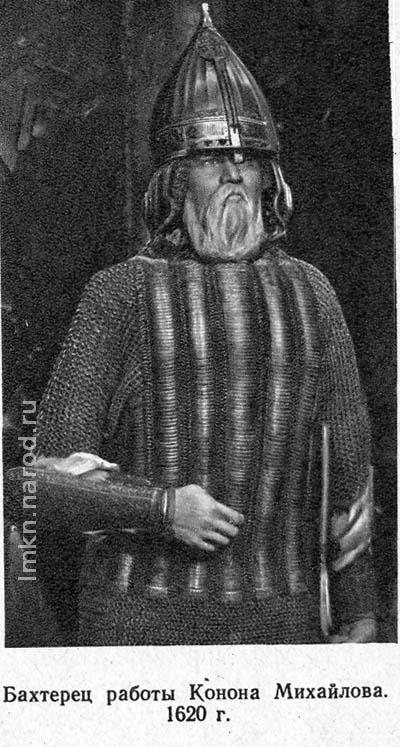I am looking for info on the origin and uses of this unique armor, especially as it applies to medieval/renaissance russia. I'd also like to know what armor it replaced, and was in turn replaced by. Thanks in advance.
here is a link to a photo of an extant piece http://www.hermitagemuseum.org/html_En/03/hm3_4_1c.html
Tom this kind of armour ,often called maille and plates as a sort of ubiquitous heading ,is to be found from the middle east to the Phillippines, from India to Russia and Eastern Europe. The plate arrangements can vary from place to place(this particular Russian arrangement of small plates through out rather than several large plates on front and sides is sometimes called jazerrant) . The Russian us of it goes back at least to the 12th century and was still in use in the 17th and early 18th century. I have seen an article from the London Times in 1852(article in History Magazine from 1966) that has a plate/picture subtitled "czarist troops from the caucus region muster" and shows mounted troops still wearing it with bows in cases at thier saddles.
Russian bakhterets, 17th century, the picture is from "Armes et Armures Russes", Editions d'Art Aurore, Leningrad, 1982:

Turkish mail-&-plate armour (jawshan), 15th century:


Armour of this type was also used in Turkey, the Mamluk Sultanate and Iran from the late 14th to the late 17th century. A lot of Russian armour from the same period does show a strong Turco-Persian influence.

Turkish mail-&-plate armour (jawshan), 15th century:


Armour of this type was also used in Turkey, the Mamluk Sultanate and Iran from the late 14th to the late 17th century. A lot of Russian armour from the same period does show a strong Turco-Persian influence.
Last edited by Hisham Gaballa on Thu 22 Jun, 2006 11:49 am; edited 3 times in total
Actually the tall pointed helmet of the second armour in Hisham's post was very popular in Russia as well dating back to the early middle ages. The Russ were noted for helms with these tall points.
| Allan Senefelder wrote: |
| Actually the tall pointed helmet of the second armour in Hisham's post was very popular in Russia as well dating back to the early middle ages. The Russ were noted for helms with these tall points. |
I have also seen pictures of Russian helms of that type. This particular example is neither Russian or Turkish though, it's actually Iranian, although it was captured by the Ottomans (possibly at the battle of Chaldiran) and modified. :)
As for the rest of the original question, prior to the use of mail-&-plate armours the Medieval Russians used mail and lamellar armour. Indeed prior to the Mongol invasions Russian warriors looked quite European, it was as a result of the Mongol invasions that Russian armour came under a strong Turco-Persian influence as the Golden Horde also would have been using Persian-style armours.
AFAIK armour remained in use until the Russian military went through major reforms in the 2nd half of the 17th century which resulted in armour being abandonned altogether.
Another 17th century Russian bechteretz:

And a Polish one, please excuse the poor quality, it was scanned from a tiny picture:


And a Polish one, please excuse the poor quality, it was scanned from a tiny picture:

Hey, that Polish ones really snazzy! I'm diggin' that quite a bit.
A Google image search produced these two pages, unfortunately I can't read Polish:
http://www.man.poznan.pl/~ritter/Html/of_bechter.html
http://www.pulawy.net.pl/karabela/zbroje.html
http://www.man.poznan.pl/~ritter/Html/of_bechter.html
http://www.pulawy.net.pl/karabela/zbroje.html
I've stumbled on the second maker once before but can't for the life of me remember where. Always have liked maille and plate armours. They have a bit more visual"depth" that plate armour.
| Quote: |
| Hisham Gaballa
Indeed prior to the Mongol invasions Russian warriors looked quite European, it was as a result of the Mongol invasions that Russian armour came under a strong Turco-Persian influence as the Golden Horde also would have been using Persian-style armours. |
It may be more precise to say that Western Russian states like Novgorod were most similar to their European neighbors, while the more southeasterly ones had greater Central Asian affinities. Many of the latter were already quite far integrated with the Kipchak Turks and shared many features of arms and armor. Prior to that those Russians had long been exposed to the Turkic Khazars and Pechenegs.
But of course, this simply bears out a point I often make, that the European/Oriental distinction is largely irrelevant to the discussion of arms and armor.
| Hisham Gaballa wrote: |
| A Google image search produced these two pages, unfortunately I can't read Polish:
http://www.man.poznan.pl/~ritter/Html/of_bechter.html http://www.pulawy.net.pl/karabela/zbroje.html |
Don't worry- I can :cool:
Quick translation of the most important info from the first link:
Copy of so called Poznanski Bechter which is now in Military Museum of Wielkopolska in Poznan.This is not the exact copy of the original(original is more ornamented) but the shape of the plates and number of lines are the same.16 lines of plates.(5 in front, 5 on the back and 3 on the sides) .It has a mail skirt and collar.
weight 10,5 kg
for a person height. 185 cm
breast circumference 105 cm
waist circumference. 90 cm
loin circumference 105 cm
Price 1000PLN (circa 350$)
(note that plates overalp in the strange way-upper go over lower plates-the difference with the items from the second link-it can be mistake or it is like in original piece-I don't know-I'm not the specialist in this kind of armour-MP)
The second link:
1.Item
Bechter - 15 lines of plates(5 front,5 back,5 sides) joint with mail The center plates has the shape to better fit the shape of man. The place overlap each other-the lower goes on the upper plate.The bechter is fastened on the right side and right shoulder. It has mail skirt fastened on both sides.
lenght 770 mm
weight13,5 kg
2.Item
Bechter - XVI century polish armour. 15 lines of plates (5 front,6 back,2 on sides) joint with mail.The center lines on front and back have a decorative shapes.They overlap like in the previous item. Bechter fastened on the shoulders (2 points on each)and on the side (3 points).With mail skirt.
lenght 670 mm
weight 11,5 kg
Sorry for the mistakes and rather poor translation-but I made it really fast and my english is not as good as should be.
Thanks Michal, I always used to think of mail-&-plate armours as being mainly Middle-Eastern and Russian. Obviously they were used in Poland as well. You learn something new every day. The first Polish Bechter looks different to the Russian and Turkish versions though. What sort of Polish troops would have used bechters?
| Hisham Gaballa wrote: |
| Thanks Michal, I always used to think of mail-&-plate armours as being mainly Middle-Eastern and Russian. Obviously they were used in Poland as well. You learn something new every day. The first Polish Bechter looks different to the Russian and Turkish versions though. What sort of Polish troops would have used bechters? |
I'm not really sure what kind of soldiers(it is not my main period of interest) but I think It would be rather calvary-maybe some kind of early pancerni calvary...I'll try to find more info.
http://smhospital.fatal.ru/SNAR/bahterec_i.html Here is described how to craft bahterec. If you want I can try to help with translation.
Here is interesting bahterec from Moscow Kremlin, whitch was found in "Ivanovskaja Ploshad". http://www.kreml.ru/ru/main/virtual/name/trea...I-XVII/10/
Here is "machine" translation of this article made through "Promt" (www.promt.ru) -
1975 at civil work on the Ivanovo area, on depth about 4 meters, richly decorated subject of arms which casual hit in the ground is excluded completely has been found.
Despite of bad safety of a thing, after restoration before us предстала the most part of a complex ¬«½ýþáÔ«-lamellar armour бахтерца, the form and which sizes are completely reconstructed. It had short sleeves (15 sm) and rectangular вырез a collar the Breast, the back and the bottom part of an armour are strengthened by the plates located in some numbers сталистого the iron, coming one on another from below upwards. Numbers of plates are connected among themselves by means of double уплощенных rings. Кольчужные rings бахтерца are fastened, basically, " on a nail ".
The humeral part of a chain armour bearing the basic loading (its weight reached ten and more kgs), is executed from the rings, fastened by two rivets (thickness of a wire of 2 mm, diameter of rings of 12 mm).
And a sleeve and other part бахтерца rings had more simple connection by one rivet. 145 breast plates of an armour were kept. They have the sizes of 39 (40) and 17 (18) mm. The humeral part of a chain armour bearing the basic loading (its weight reached ten and more kgs), is executed from the rings, fastened by two rivets (thickness of a wire of 2 mm, diameter of rings of 12 mm). The central number of plates, which length is allocated only at width of 18 mm колеблется from 50 up to 73 mm. On a back бахтерца 94 plates in width of 16-18 mm and by length 33-40 mm were kept.
They are decorated by the silver notch put on сталистому to iron, and the background of plates is processed зубильцем in a fine cell. Magnificent thin figure of a part of plates simulates the Arabian inscriptions. Near at hand masters they have turned to beautiful ornamental curls. In a set of the central numbers alternate a plate with a pattern and smooth, decorated entirely gilding.
Kremlin бахтерец is very rare and dear product of Russian gunmakers of XVI century. It is possible to consider as its nearest analogy an armour of prince Vladimir Staritskogo, the cousin of tsar Ivan of IV Terrible. Despite of losses, бахтерец and today it is looked as the fine sample of products from an arsenal of Russian soldiers of XVI century.
ps - бахтерец = bahterets
Кольчужные = chain mail
 Attachment: 86.44 KB
Attachment: 86.44 KB

Here is interesting bahterec from Moscow Kremlin, whitch was found in "Ivanovskaja Ploshad". http://www.kreml.ru/ru/main/virtual/name/trea...I-XVII/10/
Here is "machine" translation of this article made through "Promt" (www.promt.ru) -
1975 at civil work on the Ivanovo area, on depth about 4 meters, richly decorated subject of arms which casual hit in the ground is excluded completely has been found.
Despite of bad safety of a thing, after restoration before us предстала the most part of a complex ¬«½ýþáÔ«-lamellar armour бахтерца, the form and which sizes are completely reconstructed. It had short sleeves (15 sm) and rectangular вырез a collar the Breast, the back and the bottom part of an armour are strengthened by the plates located in some numbers сталистого the iron, coming one on another from below upwards. Numbers of plates are connected among themselves by means of double уплощенных rings. Кольчужные rings бахтерца are fastened, basically, " on a nail ".
The humeral part of a chain armour bearing the basic loading (its weight reached ten and more kgs), is executed from the rings, fastened by two rivets (thickness of a wire of 2 mm, diameter of rings of 12 mm).
And a sleeve and other part бахтерца rings had more simple connection by one rivet. 145 breast plates of an armour were kept. They have the sizes of 39 (40) and 17 (18) mm. The humeral part of a chain armour bearing the basic loading (its weight reached ten and more kgs), is executed from the rings, fastened by two rivets (thickness of a wire of 2 mm, diameter of rings of 12 mm). The central number of plates, which length is allocated only at width of 18 mm колеблется from 50 up to 73 mm. On a back бахтерца 94 plates in width of 16-18 mm and by length 33-40 mm were kept.
They are decorated by the silver notch put on сталистому to iron, and the background of plates is processed зубильцем in a fine cell. Magnificent thin figure of a part of plates simulates the Arabian inscriptions. Near at hand masters they have turned to beautiful ornamental curls. In a set of the central numbers alternate a plate with a pattern and smooth, decorated entirely gilding.
Kremlin бахтерец is very rare and dear product of Russian gunmakers of XVI century. It is possible to consider as its nearest analogy an armour of prince Vladimir Staritskogo, the cousin of tsar Ivan of IV Terrible. Despite of losses, бахтерец and today it is looked as the fine sample of products from an arsenal of Russian soldiers of XVI century.
ps - бахтерец = bahterets
Кольчужные = chain mail

Thanks for all the help.
| Hisham Gaballa wrote: |
| Another 17th century Russian bechteretz:
And a Polish one, please excuse the poor quality, it was scanned from a tiny picture: |
Hisham, what's the source for the Polish Bekhter photo?
| Tom Nadratowski wrote: | ||
Hisham, what's the source for the Polish Bekhter photo? |
I scanned that from an exhibition guide called 'Arms and Colours in Poland', The National Museum in Cracow.
I have another Polish bechter here, please click on the link:
http://img395.imageshack.us/img395/4588/bechter001034vd.jpg
And another Russian bakhterets here:
http://img479.imageshack.us/img479/6637/rusbakhterets0025jc.jpg
On this one the mail and plate "cuirass" is worn over a mail shirt.
Both were scanned from a Polish book called 'Stara bron w polskich zbiorach', by Zdzislaw Zygulski.
Thanks, Mr. Gaballa--
Two more books to add to my library :\ ;)
Two more books to add to my library :\ ;)
| Nathan Robinson wrote: |
| Thanks, Mr. Gaballa--
Two more books to add to my library :\ ;) |
You're welcome Mr Robinson. ;)
Actually I wouldn't bother with the first one, it's tiny.
The second one is well worth getting, loads of colour pictures of armour and weapons, mainly 16th-19th century. The quality of the photos leaves something to be desired though. It is in Polish although mine has an insert with English translations of the captions. I picked it up second-hand off ebay, however it was still pricey.
Page 1 of 1
You cannot post new topics in this forumYou cannot reply to topics in this forum
You cannot edit your posts in this forum
You cannot delete your posts in this forum
You cannot vote in polls in this forum
You cannot attach files in this forum
You can download files in this forum
All contents © Copyright 2003-2006 myArmoury.com — All rights reserved
Discussion forums powered by phpBB © The phpBB Group
Switch to the Full-featured Version of the forum
Discussion forums powered by phpBB © The phpBB Group
Switch to the Full-featured Version of the forum